Jan Carson's Blog, page 4
January 28, 2019
Postcard Stories from Jaipur


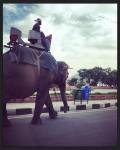

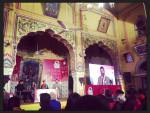

Sinead Morrissey
Jaipur, India
21stJanuary 2019
Maureen and Sally are on a Saga tour of Delhi and Jaipur. Maureen hails from Lancaster. Sally is from Manchester. Prior to this week they had never met. However, the fact that they are the only two single ladies on this particular Saga holiday, (discounting, of course, Kathleen and Annie from Sunderland, who are sisters and therefore, obvious roomies), they have been asked to share a twin room. On the morning of their third day in India, Maureen takes Arjun -their tour guide- aside in the lobby of the Lalit Hotel, Jaipur. Maureen is not usually once to complain, but she’s not had a wink of sleep these last two nights on account of Sally’s heavy snoring. Arjun listens, nodding. He says he will see what can be done about the situation. Less than ten minutes later, while they are waiting on the last of the post-breakfast stragglers, Sally takes Arjun aside and confesses that she has found herself equally incapable of getting over to sleep due to Maureen’s incessant snoring. She compares Maureen to a hoover, and not a modern, fancy one like a Dyson either. It’s an old-fashioned number she’s invoking, the sort with a suck on it which would lift paint. Arjun listens. Arjun nods. The boy cleaning the decorative fountain with a dishcloth and a bottle of squirty detergent also hears everything but does not intervene. He is only paid to clean.
Sonya Whitefield
Jaipur, India
22nd January 2019
There are hundreds of pigeons congregating around the gates of the Albert Hall. Although this is Jaipur, India, not London, England, the pigeons look very similar to those pigeons usually found flocking around the steps of the original Albert Hall. A man squats in the midst of the pigeons scattering birdseed in wide, arcing loops. This man has a heart condition. His doctor has prescribed two hours per day in the presence of pigeons. “Pigeons,” claims the man’s doctor, “are more beneficial than both medication and meditation when it comes to heart conditions.” The man had been sceptical at first. Then, after some weeks, found that the pigeons’ flapping wings caused a slight fluctuation in the air which passed over his poorly -body gently, therapeutically, with great, yet measured power- so he no longer felt so tight in the chest and his palpitations eased and he was able to return to work on a part time basis. The man remains unsure as to whether it is the pigeons who have healed him, or his own change of outlook which is now optimistic/determined/disciplined. He continues to visit the Albert Hall each morning though he does not tell his colleagues where he disappears to everyday, between the hours of 10 and 12.
Anna Gale
Jaipur, India
23rd January 2019
There was nowhere else available so they booked a room at the Hotel Kafka. It was much cheaper than they were anticipating; approximately a third of what they’d been paying at the airport hotel. “Why so cheap?” she asked. “Maybe it’s something to do with the name,” he replied and they both laughed and riffed for almost five minutes or so on the idea of spending the night in a hotel named after Kafka. “Dear only knows what you’d be when you woke up,” he said, and she laughed some more, and contorted her face into a buggish grin. The following morning when they did wake up, she was disappointed to find he was still a man and she was still a woman and neither of them bore even the slightest resemblance to any kind of insect. “I guess it’s just a name,” she said, though at the back of her mind she was thinking about all the other stories Kafka had written. It was years since she’d last read any aside from the obvious one, but she’d retained a vague memory of cruel and unusual plot twists; things which could be inflicted upon a human mind or body, insidiously, without knowledge or consent. All day she kept asking him if he was feeling ok and he kept saying, “yes, I feel fine, stop asking me,” but something in her did not believe he was telling the truth.
Carys and Michael Davies
Jaipur, India
24th January 2019
At the back of the room a man is standing behind a table feeding chips into a deep fat fryer. It is raining outside and the room is packed full of people who’ve taken shelter. These people are not interested in the poet reading from the lectern at the front, or the literary agent who will follow him onto the stage to talk about issues related to publishing short story collections, or even the famous Bollywood director who will close proceedings with a short speech, delivered in Hindi. They are only interested in staying warm and staying dry and not being struck by the forked lightning which is currently zip zapping across the front lawn. When they spot the man with the deep fat fryers they do not question why he is here, at a literary event. They do not take time to discover that this particular event is sponsored by McCain potato products. They simply line up and wait for a portion of hot chips and receive their chips gratefully. Then, they stand around the edges of the room enjoying the sensation of heat seeping through a paper plate, defrosting rain-chilled fingers. There is a specific word for discovering hot chips at a dull literary event on a cold, January afternoon. The English translation of this word falls somewhere between surprise and blessing. When pronounced correctly it curls up at the end like a shy smile.
Maureen Robinson
Jaipur, India
25th January 2019
You did not realise you needed to be clear with the man at the travel desk. You ordered a taxi to the palace but did not specify that it was an ordinary taxi you were after: a white, four-wheeled number, driven by an ordinary man. When your taxi arrived the car itself was unremarkable. The driver looked normal enough until you left the safety of the hotel car park, at which point, he cranked the car’s stereo up to ear-shredding levels and began to gyrate wildly, hands flying through the air, head nod, nod, nodding along to the pulsing beat, while the car dipped in and out of traffic, losing and gaining speed, ricocheting off other cars like a pinball, or a light-blind insect, or an atom observed under a microscope, and you realised then, that this was no ordinary taxi driver you’d hired. This was a djinn behind the wheel and you racked your brain to remember whether djinns were mostly good or mostly evil and seemed to recall they went either way and occasionally granted a wish or two. So you wished for a seatbelt, and a set of killer brakes and, with your third and final wish, asked for a clear road right through to the palace gates though you did not know if your djinn driver could hear you wishing over the music and the racket of car horns and screeching brakes.
Conor Garrett
Jaipur, India
26th January 2019
There are two rival gangs of monkeys operating in this area. The black-faced monkeys are content to sit in the trees consuming nuts, or scavenge through the villagers’ garbage in search of discarded fruit. The red-faced monkeys are not so placid. They descend upon the small houses of the village in a rabid pack, opening windows with their tiny, monkey hands. They sneak through doors and, where chimneys are available, will squeeze their skinny bodies down the flue, like Santa, but not so generous. One monkey remains outside at all times, playing look out. He scours the street for returning home-owners. Meanwhile the other monkeys swarm through the house, ransacking the fridge, lifting jewellery from the dresser in the bedroom, upsetting the pots and pans so they clang to the floor with a sound like church bells, struck. They take more than they need and do not strictly need most of the things which they take: earrings, for example, which are of no practical use to a creature whose ears are not pierced. The black-faced monkeys despair. They are disgusted by their red-faced rivals. They tend to avoid red-faced monkeys when confronted by them in the streets and back alleys of the village. If asked, they will usually say, “those red faced lunatics, give proper monkeys a bad name.”
Zulfikar Hirji
Jaipur, India
27th January 2019
On the way back down the mountain from the fort -which is the smallest, and arguably least impressive of the city’s three forts, though blessed with unparalleled views- the brakes on the bus failed, causing all twenty four writers, poets, historians, journalists and philosophers to go sailing through the crash barrier, out into the midnight black. There was nothing beneath the bus’s screaming wheels but several thousand feet of air, and beneath this air, unrelenting earth, rocks, shrubs and a few startled snakes. As they plummeted towards certain death the writers wondered if they were famous enough yet to merit a mention in the Guardian’s obituary column, while the journalists composed terse columns of copy outlining events leading up to their own deaths, and the poets teased out complex metaphors which would cast much-needed light upon the situation in hand: falling to one’s death in a rickety coach was like a sudden rainfall, or competing in the downhill slalom, or discovering your Netflix account had expired just when you needed it most. Only the historians on board the coach were truly present for they had always understood what it is to briefly be a footnote on a larger page and had been anticipating a moment just like this one for many, many years.
January 14, 2019
Postcard Stories From Annaghmakerrig
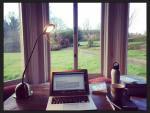






January 7th 2018
Annaghmakerrig
Cathay Burnside
Consider this humble Sat Nav, stuck with saliva to the windscreen of a Vauxhall, Corsa. Pity the way it slips from position every third or fourth trip leaving a ring-shaped dimple on the dirty glass. Then, the indignity of being licked and shoved back into its own caked filth. This Sat Nav has no freewill. In theological terms it is little more than a victim of predestination, programmed to proceed directly to the allocated destination, narrating this route in increments of miles, (or kilometres when in the South). It’s heart may skip an electric beat when the Corsa’s wheels turn down a forbidden street. It may well think to itself, maybe, for once, I might not know when I’ve reached my destination. But, no; the Sat Nav cannot yet manage autonomous thought. “Make a U Turn and proceed directly to the route,” it chirrups. It is no doubt sick of its own stupid, elevator voice. Consider the Sat Nav and feel unsurprised when every so often it directs you straight through a section of the Peace Wall, or bids you take the third exit on a two exit roundabout, or leads you to a boggy field, only to tell you with unswerving certainty, that your destination has now been reached. It is not badness which causes the Sat Nav to rebel, so much as the boredom of a programmed thing.
January 8th 2018
Annaghmakerrig
Diane Holt
An unfortunate, but unavoidable incident is unfolding in the front bedroom of the big house. The poet who is occupying this particular room for a period of some fourteen nights has left his spectacles back in Dublin. And though this oversight, (pardon the pun), will have little impact on his ability to read works by WB Yeats and contemporaries, or compose long villanelles on mostly pastoral themes, it will unfortunately render the same man incapable of discerning objects at a distance greater than two feet.
“Good job I’m short-sighted, not long-sighted,” he explains to his fellow poets and artists when they gather for dinner in the big house kitchen.
“Indeed,” says the sculptor who’s over from Brussels, and the children’s writer from Donegal.
But the ghost who haunts the house’s residents cannot bring herself to agree. She has spent all week pacing the floors of the poet’s room. She has hovered, and sashayed, and evaporated once. He has mistaken her efforts for a twitching curtain and she can’t face the indignity of zooming in. Yet, if she continues to haunt in her usual manner the feeble-eyed poet will leave without knowing he’s been visited.
January 9th 2018
Annaghmakerrig
Heather Dornan Wilson
A pen and ink drawing hangs next to the desk. The artist’s name is obscured by the frame but the title is clear enough: The Rural Conversation. It looks like an illustration from an old-fashioned novel; something published in Jane Austen’s time. It captures three individuals in a pastoral setting. The first man is sitting cross-legged on the crumbling ruins of what looks to be a kind of temple. The second man stands beneath him with a stick in his hand. A border collie sniffs round his feet. The third individual captured is clearly a woman. Her back’s to the artist obscuring her face, but her dress, and her hair, which is coiled high on top of her head, and the swell of her hips, all speak of the fairer sex. This woman is kneeling, bending forwards. At first glance she appears to be worshipping the man. She is not included in the rural conversation. Her head is lowered. She is silent in the presence of men. On closer inspection of the woman’s hands, a sheet can be seen and a pool of water. She is laundering her linens on hands and knees, while the men make small talk and glance down upon her and do not give her the time of day. Woman working. Men making idle. Thus it was in Austen’s time.
January 10th 2018
Annaghmakerrig
Julianne Skillen
It is certainly not a purposeful act. Edging down the corridor with a tray full of dishes, her leg clips the side of a rickety chair. The chair shakes briefly, then rights itself. No harm’s done. But she hasn’t noticed the acoustic guitar propped up again the chair. It sashays too, tries to centre itself and can’t quite find its own balance, then slams face first into the parquet floor. The noise it makes falling is incomparable. Piano strings struck or wooden spoons dropped might come close if such elements could be combined. The sound rumbles round the guitar’s hollow belly, as if an echo is trapped inside. She snatches the guitar up and checks for damage. She runs her fingers across the polished wood. Nothing’s snapped or bent or broken. The lacquer is smooth and untroubled both front and back. She apologies for her clumsiness; not to the guitarist, to the guitar itself. She returns it to its former place. The kitchen’s full of noisy chatter and no one’s heard the guitar fall. It doesn’t seem worth mentioning. The guitarist never has to know. He continues playing the same guitar. It travels with him round Mainland Europe, on a tour of mid-sized music venues. He notices it’s started sounding so much richer on the sad songs and the staple blues. “When you hear it sing,” the guitarist tells his drummer, “you’d think some woman’s broke it’s heart.”
January 11th 2018
Annaghmakerrig
Inga Zolude
After lunch several of the writers went swimming in the lake. Swimming in the lake was a thing they associated with writers in the past. Hemingway, for example, and possibly Keats. The lake in question was brown and muddy. Frogspawn clung to the edges like the jellied skin on potted ham. The swimming writers swore that the water was quite warm for January, though it was entirely possible they were comparing the water to something much colder than a January lake: ice cubes, perhaps or the Arctic Tundra. During the swimming the non-swimming writers stood around the edges of the lake passing witty comment and taking unflattering photos to be posted later on various social media platforms. After swimming in the lake, the swimming writers said they did not regret swimming one little bit and felt invigorated by the experience. The non-swimming writers said they did not regret not swimming one little bit either, and felt, “absolutely foundered,” just watching the whole thing. Secretly, the swimming writers were so cold they could not stop shivering all afternoon and found themselves incapable of holding a pen straight, let alone writing anything of lasting consequence. Secretly, the non-swimming writers felt pissed with themselves because once again they had not fully embraced the moment. They wondered, as they often wondered, if this inbuilt reticence was to blame for their writing, which rarely seemed to fulfil its own potential.
January 12th 2018
Clones
Jackie Law
The ATM in Clones main street is all out of money. Instead, it is dispensing individual pieces of wisdom, printed on paper slips roughly the shape and size of a twenty Euro note. A queue has formed next to the ATM. It snakes all the way down the street to the chip shop which is also a kebab shop and a place that does takeaway pizza. The news passes quickly along the line: “the hole-in-the-wall’s all out of cash, but it’s giving out wee messages instead.” The people in the queue are intrigued. They’re in need of actual money, but still, it’s not everyday a machine has something specific to say to you. They wait their turn, edging slowly along the bank’s wall until they arrive at the ATM. They insert their bank card, key in their code and, when the options flash up on screen, tap the only option available tonight: BESPOKE WISDOM. ONE UNIT. FREE. The machine clunks into motion. Its internal mechanisms clunk and rumble before spitting out a single piece of white paper. Each person reads their own piece of bespoke wisdom. There are a wide variety of wisdoms offered and each one is indeed curiously specific to the recipient’s situation. “Pay no heed to your Aunty Susan.” “I probably wouldn’t wear that skirt out again.” “Remember four’s your limit for a weekday night.” Each person keeps their own message private. They tuck them into purses and jacket pockets and scurry off to find Clone’s other ATM. It’s all very well dispensing wisdom, but they don’t accept wisdom at the bar.
January 13th 2018
Annaghmakerrig
Victoria Stone
She walks along the path between the forest and the lake. The morning’s rain has yet to evaporate and ground is sliding under her feet. She regrets her choice of footwear. The day is already beginning to sink beneath the surface of the lake and everything looks washed out in the fading light. It is impossibly quiet out here, a half mile or so from the big house. She can hear each step squelching as her foot leaves the ground. The sound of her breath rasps back at her. In the trees’ branches two small birds sing at each other, their tinny voices twinkling out across the lake. In a louder place she might have missed the noise in the forest. She might not have heard it until it was right up and upon her. But here, the quiet is on her side. It amplifies, echoes, even alarms, allowing her body to tense and pulse as the noise in forest grows closely loud. The quiet draws back like a pair of curtains. It whispers, “here is your chance. Now, you must run.” But the noise in the forest is like a wave, rushing at her, all at once. And she doesn’t run, or even move. And then, all of a sudden, the quiet is gone.
January 12, 2019
Happy Birthday Holby City
[image error]
Holby City turns twenty years old today. I was eighteen when I tuned into the first episode. I watched it with the third year medical students who lived in my university halls of residence. It was useful having them around so they could clarify what certain procedures actually were. I do not consider it at all tragic that we often watched Holby with a stack of medical textbooks piled next to the TV. I am significantly older than eighteen now. I realised today that I have been watching Holby for most of my life. In fact, if you count up the hours I’ve spent watching the goings on on Darwin and Keller it comes to around 900 hours of viewing, which equates to almost a solid month and a half of observing medical procedures and clinical skills. By my calculations this is roughly equivalent to spending about a year and a half in medical school. I probably wouldn’t attempt open heart surgery yet, but I’d definitely have a stab, (no pun intended), at fitting a chest train or a tracheotomy tube. (Nb. I once successfully performed the Heimlich on a baby with skills gleaned entirely from Casualty/Holby City).
Over the years I’ve seen some fantastic Holby characters come and go: Nick Jordan, Anton Meyer, Faye, Raf, (who murdered Penny the paramedic in Casualty and three months later appeared upstairs as a hot shot surgeon. Surely, this must be the casting department’s best ever continuity error), Michael Spence, Mo, Malick, (who’s arm came off), Joseph Byrne, (poshest doctor in the history of the world), Digby and Morven, Olly Valentine and Tara, quickly followed by Olly Valentine and Zosia, Mary-Claire and Harry, (who’s face came off), Chantelle and Elliott Hope and Elliott Hope’s dog, and my all time favourite Holby Character, Dr Alex, (who was also in Natalie Imbruglia’s video for Torn), and got in trouble for accidentally operating on somebody drunk after drinking cranberry juice spiked with vodka and not noticing, (hmmm). I’d also like to pay special tribute to the late great, sadly missed Penny Valentine who was a brilliant character for about two seasons and then was written off, unbelievably quickly, in the space of one show. (Passing orderly: “Have you seen Penny Valentine this afternoon?” Senior Consultant: “Oh, no, she just died.”)
I have learnt a lot about life from watching Holby City, for example, it is ok to bring your dog/parrot/goat into hospital with you so long as it is a particularly pathetic example of the breed in question, and you have nowhere else to leave it. As a patient in a hospital, facing an essential surgical procedure, you are expected to repeatedly resist this procedure and insist upon getting home as quickly as possibly only to collapse in the corridor/lift/car park. You are also expected to conceal key facts about your condition so they can be discovered later at a particularly fraught moment in surgery. It makes not one jot of difference if the consultant treating you tells you that your condition can be controlled without surgery, 35 to 40 minutes after your diagnosis, something inside you is going to rupture/shatter/collapse and you’ll end up in the operating theatre anyway. Every single senior consultant keeps a bottle of something strong and alcoholic in the top drawer of their office desk.
Despite the fact that Holby is one of the lynchpins of my adult life, I am often asked by friends, (even close friends), how it differs from Casualty. These people don’t seem to understand why, as a person who doesn’t own a TV and watches little else, (save the Morse franchise), I insist upon maintaining obsessive allegiance to two almost identical medical dramas. I consider these people to be quite ignorant, and reasonably poor friends. Approximately 40% of the conversational content which has come out of my mouth in the last two decades concerns either Holby or Casualty. If they’d actually listened to anything I’d said they’d know that Holby and Casualty are set in the same hospital: Casualty‘s the emergency department and Holby focuses on the wards upstairs. Ie they are two very different shows. However, seeing as it’s Holby‘s birthday and some of you might not be fans, (yet), here are ten easy ways (aside from asking yourself if it’s Saturday or Tuesday), to know you’re tuned into Holby and not Casualty.
The basement features heavily – the basement is like the dark underbelly of Holby: it is where most Holby characters go to get killed. Various pets, homeless people and runaways have been hidden down there. Gaskill’s mad science lab was in the basement and Tara’s experiments into shrinking her own brain tumour and Petrenko goes down there to pummel a punch bag. If anyone’s going to be trapped somewhere with an unexploded bomb/dangerous contagion/unhinged gunman/, you can bet it’ll be the basement they find themselves in.
Everyone’s going to Albie’s – For years and years everyone in Holby has gone to Albie’s for drinks after works. Though the characters in Casualty work in the same hospital they only ever drink in The Hope and Anchor. Both drinking establishments appear to be situated in the car park of the hospital. This has never struck me as the best location for a pub.
Nobody ever goes outside – Once in a blue moon a Holby character will leave the wards and venture to a medical conference. Otherwise their world consists of the interior landscapes of the hospital, Albie’s, the memorial garden, (which signifies a contemplative moment), or the car park, (which usually means some patient’s about to collapse while leaving or be pitched out of a speeding car to land, bleeding profusely, on the hospital steps). Casualty characters get to roam wildly round the fictional landscape of Holby the city, which includes a beach, a river, a mountain range, a mid-sized airport, a football stadium, several ropey looking shopping centres, a high security prison and a housing estate, which may or may not have been lifted from the set of Shameless.
Someone’s always trying to convince Jac Naylor to let them transfer to Darwin Ward: These conversations usually go as follows. Incompetent Young F1: “I’d like to do my next rotation on Darwin because I am passionate about a career in Cardiothoracics.” Jac Naylor: “No! Go away. I am very angry with you.” IYF1: “Why can’t I move to Darwin?” JN: “Because I don’t like you and you are also incompetent.” IYF1: “Ok, I guess I’ll just stay on Keller.” Approximately 40 minutes later. JN: “You have proven yourself capable of cardiothoracics by sewing up a heart using only your teeth/operating in pitch black after the generators failed/talking the elderly anaethetist down while he had an anxiety attack in the middle of surgery. You can start on Darwin, immediately.”
Fletch’s children have rocked up unannounced: Nurse Fletcher is a single dad to approximately 47 children. The all look like urchin-esque extras from Oliver Twist and spend more time on the wards of Holby than they do in school. When he worked in the Casualty department they never appeared, but now, since transferring upstairs they are pretty much ever-present. They are probably drawn to the vending machine in the corridor which dispenses generic chocolate bars with names such as Chocco and Caramel Delight.
Someone is making a passing reference to a past character: Eg. “Here’s a postcard from Zosia, she’s having a great old time, not being mad in the States.” “I just heard from Malick. He is getting married, but he still only has one arm.” “It is sad that Digby’s still dead.”
People are carrying takeaway coffee cups around in a very unconvincing manner: For some reason people in Casualty use full coffee cups as props, while Holby characters sip from coffee cups which are clearly only filled with air.
Henrik Hansen is ever present: Despite being in charge of the entire hospital, everyone’s favourite lanky Swede seems somewhat disinterested in his A&E department and only visits Casualty once or twice a year, while he’s pretty much omnipresent, loitering around the corridors of the upstairs wards.
Lexy the Vicar is sick again: Lexy is the chaplain of Holby City. She is lovely but she is not a very good chaplain, in that she mostly talks about how much she is doubting her calling and gets sick, (heart attacks, cancer, becoming impaled on a large stained glass depiction of Jesus). However, it is also good when Lexy appears in Holby as it usually means someone is going to get married by the end of the episode and require an emergency vicar with doubts and a gaping chest wound to do the honours. Lexy does not seem to care about the spiritual well-being of the patients or staff in Casualty.
Groundbreakingly innovative new medical techniques: Not content to function like a regular NHS hospital the staff at Holby City are always pushing the boundaries of research. They make mechanical hearts out of what look to be bits of insulating pipe. They try to make people with spinal injuries walk again by doing something fiddly and never quite defined with stem cells and ankle muscles. They conduct rudimentary versions of face transplants. Unsurprisingly enough these research projects never quite take off but the consultants involved always seem able to engineer another half-assed attempt at a powerpoint presentation with the funders and, in doing so, secure a million or two for their next crazy scheme.
December 31, 2018
My Favourite Reads of 2018
[image error]
2018 was my best reading year yet. I thought I’d managed to read 190 books, but it turns out I counted them up wrong and it was actually 189. 189’s not quite as satisfyingly well-rounded as 190 but it’s still an absolute rake of books. Volume aside, I have to say I enjoyed my reading much more than usual this year. I’ve stopped trying to keep up with contemporary publications. It was making me a little anxious attempting to read everything people were talking about as it came out. This year I’ve just read what I fancied reading, whenever I fancied reading it. As I said at the end of last year, a good book’s a good book regardless of when it was published. If it’s an exceptional read this year then it’ll still be an exceptional read five years from now, when it’s no longer topping the Best Of lists. My favourite reads of this year list reflects this decision. I’ve chosen books which captivated me regardless of whether they were published this year or not. Apologies if this is frustrating. I’ll probably get round to reading this year’s books now, about 2022.
Here are my reading statistics for 2018:
89 Novels
32 Short Story Collections
41 Works of Non-Fiction
19 Poetry Collections
17 Works in Translation
51 Books by Irish Writers
105 Books by Women
84 Books by Men
This year I read some fantastic books about writing. I discovered Elizabeth Strout, (why on Earth did it take me so long?) I did my best to read more work in translation; the Eastern European Short Story Festival helped me realise what a wealth of wonderful writing from non-English speaking countries I was missing out on. I loved some very short books. It was definitely a good year for the is-it-a-novella-or-a-novel type books? I did not read as much poetry as I’d have liked to. Here are my favourite reads -the books I honestly enjoyed most- in 2018. I’ve split them into six categories and then listed thirty other exceptional books in no particular order. I’d thoroughly recommend all thirty six of these books. I hope you’re reading year’s been wonderful and you’ve bought all your books from one of our wonderful independent bookstores. May 2019 find you making a significant dent in your own personal “to be read” piles.
Novel of the Year:
Will Eaves – Murmur
[image error]
Poetry Collection of the Year
Nick Laird – Feel Free
[image error]
Translated Work of the Year
Samanta Schweblin – Fever Dream
[image error]
Irish Book of the Year
Michael Hughes – Country
[image error]
Classic Read of the Year
Russell Hoban – Riddley Walker
[image error]
Non-Fiction Book of the Year
Rebecca Stott – In the Days of Rain
[image error]
Thirty Other Brilliant Books I Happened To Read In 2018
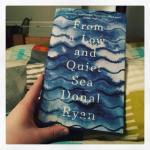
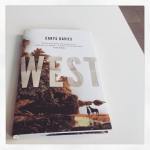
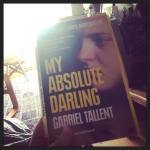
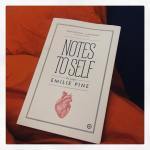

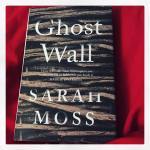
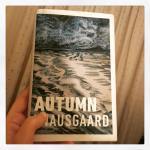
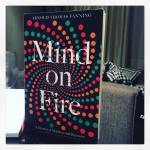
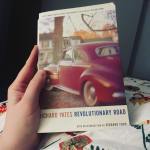
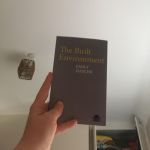
Donal Ryan – From a Low and Quiet Sea
Carys Davies – West
Gabriel Tallent – My Absolute Darling
Emilie Pine – Notes to Self
Fiona Moseley – Elmet
Sarah Moss – Ghost Wall
Karl Ove Knausgard – Autumn
Arnold Fanning – Mind on Fire
Richard Yates – Revolutionary Road
Emily Hasler – The Built Environment
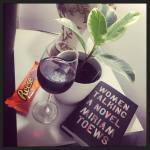
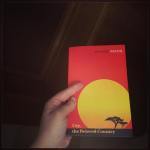
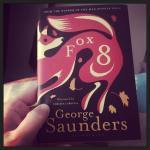
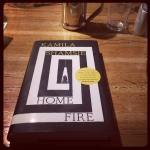
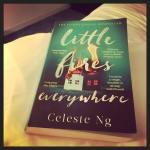
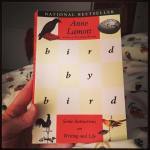

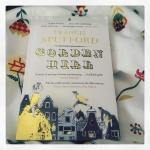
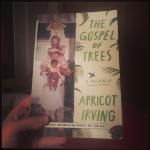
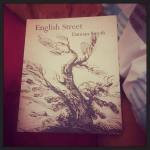
Miriam Toews – Women Talking
Alan Paton – Cry, The Beloved Country
George Saunders – Fox 8
Kamila Shamsie – Home Fire
Celeste Ng – Little Fires Everywhere
Anne Lamott – Bird By Bird
Alessandro Boffa – You’re an Animal Viskovitz!
Francis Spufford – Golden Hill
Apricot Irving – The Gospel of Trees
Damian Smyth – English Street
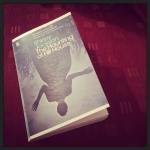
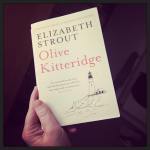
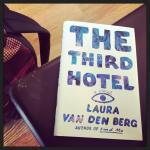
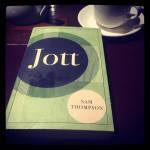
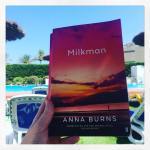
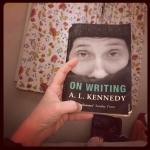
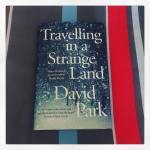

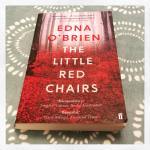
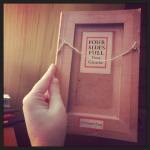
Shirley Jackson – The Haunting of Hill House
Elizabeth Strout – Olive Kitteridge
Laura Van Den Berg – The Third Hotel
Sam Thompson – Jott
Anna Burns – Milkman
A.L. Kennedy – On Writing
David Park – Travelling in a Strange Land
Wendy Mitchell – Somebody I Used to Know
Edna O’Brien – The Little Chairs
Vona Groarke – Four Sides Full
December 26, 2018
My Favourite Films of 2018
It has not been a good year for me and movies. I traveled around too much. The QFT was closed for refurbishment for about a century. I lost my password to Netflix. I only managed a paltry 75 films this year; about 30 less than last year. I also noted a worrying trend, (which you’ll see reflected in some of my short reviews). Otherwise sublime films were repeatedly ruined by heavy-handed directing/writing/acting in the final ten minutes. I found myself leaving the cinema several times muttering, “I loved that movie until the last ten minutes.” I’ve also left out Three Billboards which would probably have made my best of list if I hadn’t rewatched it six months later. It just doesn’t stand up to a second viewing. If I had to draw any judgments about myself based upon my favourite movies of the year I’d say this year I mostly fell for very traditional storytelling, strong character driven pieces and tight scripts. These might not be the trendiest movies of the year, but they’re the films I genuinely enjoyed the most. I’ve limited myself to one stand out movie plus ten other must-sees and a clunker so bad it would be remiss not to warn you off it. I’ve included photos and the short reviews I wrote at the time.
I will now make my annual plea to support your local independent cinema; ideally this will be the QFT. Buy a membership. Support independent programming and film festivals. Buy all your snacks in-house. I still don’t like musicals and I thought Widows was dull as got out. That’s me signing off for 2018.
Movie of the Year: You Were Never Really There
[image error]
“I always say the best movies leave you with an oddly unsettled feeling that what you just watched was reality and the real world isn’t quite real anymore. I will be reeling from this for days. It’s brutal. It’s beautiful. It’s utterly hopeless and at the same time really optimistic. It left me feeling the same mixed up bag of emotions I felt the first time I watched Half Nelson. Go see. Or maybe don’t if you have kids.”
Twelve (Sorry I Just Couldn’t Get Them Down To Ten) Best Movies of the Year
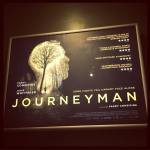
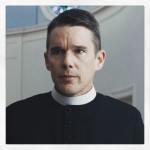
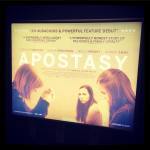
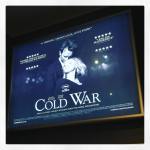
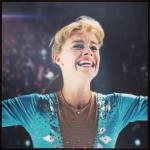
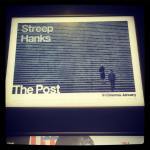
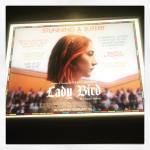

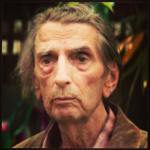
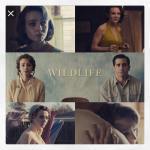

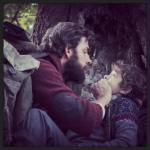
Journeyman. “Oh dear goodness, Paddy Considine just broke my heart in a really good way. It’s years since I cried this hard over a film. Stunning.”
First Reformed. “One of the best films I’ve seen this year, possibly the best role Ethan Hawke’s ever had, worst ending I’ve been subjected to in ages.”
Apostasy. “No fuss. No nonsense. Just a powerful script and some incredible acting. Surely a contender for British film of the year.”
Cold War. “This is stunning. One of the most beautifully shot films I’ve seen in a long, long time.”
I, Tonya. “I’ve been waiting ages to see this and it did not disappoint at all. It’s such an odd story and superbly well delivered with some great performances. What I wasn’t prepared for was how emotional I felt by the end of the story. There are no heroes here but it’s really hard to tell who the villains actually are.”
The Post. “Hats off to Meryl Streep. She’s just too marvellous and this is a great wee movie which actually could have been a tiny bit longer. I feel like the last part was a little rushed but the rest of it is a great watch.”
Ladybird. “Dear Greta Gerwig, wherever you’re heading I’m right behind you. Laughed, cried, remembered the time I thought Dave Matthews was the highest form of art.”
The Miseducation of Cameron Post. “Such a hard watch but what a powerful piece of cinema. Chloe Moretz plays a blinder.”
Lucky. “The perfect movie for the day that it’s been. We are so very fortunate to have had Harry Dean Stanton for such a long time. What a beautiful man.”
Wildlife. “I loved this. Carey Mulligan is brilliant. It’s shot beautifully. It’s subtly disturbing. The only thing I struggled with was believing that Carey Mulligan and Jake Gyllenhal’s combined genes would have created such a strange looking child.”
Darkest Hour. “There’s a fair amount of sentimental bunkum thrown in here but some of this is epic and Oldman is phenomenal and I have to admit the sentimental bunkum still made me cry. Definitely worth a watch.”
A Quiet Place. “This is brilliant. Great cast. Interesting concept. Lots of good twists. AND it’s only 90 minutes long.”
Absolute Worst Film of 2018, (Possibly the Decade)
[image error]
Downsizing. “I don’t understand. How can you be responsible for Sideways and The Descendants and think this utter drivel is fit to be called a film. Completely banal. Downright offensive in places. And, even though, at one point, there’s the distinct possibility that Matt Damon might be locked in an underground cave for 8000 years, potentially redeeming the movie a little, yes, you’ve guessed it, they let him out to mumble more fridge magnet truisms whilst sporting a range of block coloured polo shirts and chinos. I have not been this cross at a movie since that rubbish with Viggo Mortenson playing a hippy and dancing around to Guns n Roses. Already a candidate for most pointless film of 2018.”
December 24, 2018
Top Ten Moments of 2018
[image error]
Well, that was some year folks. 2018 was a busy one. I think I peaked with working seven projects simultaneously. I edited one novel, wrote another one, plus a short story collection, curated three literary festivals, facilitated a rake of really wonderful community arts projects and spent about a third of the year gallivanting round the world reading in lots of exotic places. 2018’s not quite over yet, but as I’m putting my feet up for the next few days, I thought I’d take a few minutes to recap on my best writer moments of the last year. Here are my ten favourite in no particular order. Thanks to everyone who took part in projects, got involved in festivals, came to workshops and readings, encouraged, listened and helped to make this such a special year.
NB: Notable mentions also need to go to the fantastic Ian Cochrane retrospective at The Heaney Homeplace, LitCrawl Belfast, Sarah Perry’s reading at the Crescent in November, Ali Smith’s reading at Mountains to Sea, interviewing Carys Davies for BIAF, the Ian Sansom launch in No Alibis, Agreement 20, Emma Must’s reading for Bill Clinton and Senator George Mitchell, discovering Elizabeth Strout, teaching my first academic classes as a visiting lecturer at the University of Ulster, Everything Getting Worse All The Time, (the event not the concept), winning the Jack Harte Bursary from the IWC, the CS Lewis Festival (particularly Damian Smyth, Bernie McGill and the Darkling Air in Campbell College’s Great Hall and talking Flannery O’Connor with Padraig O’Tuama and Andrew Cunning), Wendy Erskine’s book launch, NI Library Tour with Barney Norris, Mountstewart Festival of Ideas and Janice Galloway’s ode to Muriel Spark at Edinburgh Book Festival
[image error]
Receiving the proofs for my next novel, The Fire Starters to be published by Doubleday in April. Holding your own book for the first time, never gets old. [image error]
Workshopping, writing and recording a radio drama about being a Carer with a bunch of the most inspiring people I’ve ever worked with. Big thanks to Eastside Arts for having the vision to support this project. [image error]
My week in Croatia for the Eastern European Short Story Festival, literally the most fun you can have on a tourbus with a bunch of very tipsy poets and some of the best short story writers in Europe. Also, some fantastic readings in Hungary, Austria, Norway and the Netherlands. [image error]
Helping my ten year old nephew to write a first draft of his debut novel. It’s probably going to hit the bestsellers list around about 2020. [image error]
Scripting and shooting short films with a bunch of truly wonderful older people as part of the QFT’s 50th Anniversary celebrations. (Special mention to the three feisty ladies who made a trailer for Jaws without ever seeing the film). Thanks to Marion Campbell for unswerving report and help with this project. [image error]
Recording a Listening Project (lifetime ambition) for Radio 4 with the formidable Hilary Copeland. Tune in sometime in Spring 2019 to hear us wax lyrical about the Belfast Arts Community. [image error]
Curating the inaugural Hillsborough Festival of Literature and Ideas for the John Hewitt Society; a lot of hard work, also a lot of fun. Yet another reminder that it pays to work with good people. [image error]
Writing and recording a sound installation for the Tropical Ravine with Kwame Daniels and a bunch of brilliant Community groups. Thanks to Cailin Lynn for support and helping this project get off the ground [image error]
Having an essay included in this year’s Winter Papers. I’ve always loved what Kevin and Olivia have done with WP over the last few years and it was such a treat to have a piece published alongside some writers I really admire. [image error]
My three months as the Irish Writing Centre’s Roaming Writer in Residence, traveling all over Ireland, writing stories on the train. [image error]
What a hectic, brilliant, exhausting and inspiring year.
December 23, 2018
The First Christmas After
[image error]
They’d never bothered with children. They hadn’t felt the need. Ellen wasn’t the maternal type and Phil was always away with work. When Phil died several of their friends had said, “it’s a pity you never had children. They’d be company for you now.” Ellen said they’d been happy enough as they were. But it got her wondering. Perhaps children would’ve been nice; just one or two; a boy and a girl. They’d be fully grown now. She might’ve been a grandmother; Lord knows she felt old enough.
It was almost Christmas by this stage -Ellen’s first without Phil- and the thought of little people running about the place, unwrapping presents and singing silly Christmas songs, began to play on her. The house felt too big for one person. Ellen rattled round it, eating most meals in front of the telly; there seemed little point setting a table for one. She went backwards and forwards when it came to the tree. Would she decorate, or leave it this year? It was no hassle throwing up a few bits of tinsel, hauling the tree out of the hall cupboard. But could she be bothered and what was the point? Would people think it too soon to be stringing up fairy lights with Phil only just dead? In the end, Ellen compromised: she put the tree up but didn’t bother with anything else. She knew that if she didn’t make the effort, it’d set a precedent. She’d never have Christmas in her house again.
With the tree up Ellen felt even lonelier. The fairy lights required too much of her. There was something particularly pathetic about crying in the company of a Christmas tree. She took to sitting in the dark, watching the murder mystery shows they’d once enjoyed together. She kept the TV going even when she wasn’t in the room. She couldn’t bear a silent house. Ellen was not without offers of company. The advent of December brought a slew of well-intentioned invitations. She politely declined them all. Her sister, in Larne, insisted she should join them over the holidays. Next door invited her round for Christmas dinner, (“no pressure, Ellen. Just pop in when you want and slip away if it gets too much.”) Then, there was the church’s Leftovers Dinner, for folks who’d no place else to go.
She didn’t have to be alone at Christmas but none of the alternatives appealed. Ellen didn’t want just anyone’s company. She only wished to be with Phil, doing Christmas together, in the usual way. By the twenty first she felt inclined to take the tree down and be done with it. She was in the cupboard fetching the box when she came across her knitting bag. Phil hadn’t been keen on her knitting. He’d said it was the sort of thing old ladies did and she’d said, “I am an old lady.” He’d laughed then and sneaked his hand up her skirt. “There’s still plenty of life in you yet,” he said. Remembering this knocks the wind out of Ellen. She has to sit down for half an hour. When she recovers, she notices the knitting bag is still in her hands. She takes out a ball of doubleknit and a pair of needles and, without thinking, casts forty stitches on. It helps to have her fingers occupied. Lately, she’s begun to bite her nails. She turns on ITV3 and is three ads into Miss Marplebefore she admits what she’s started to knit. A person; specifically, a man. Full-sized, with facial features stitched in black. Ears. Mouth. Fingers. Toes. No hair required, because this man is bald. Ellen knows this, because she knows it’s Phil.
It takes three days to finish him. While knitting Ellen keeps track of how many murders she’s watched on TV. Twenty nine. She’d anticipated more. It’s still more bearable than watching BBC or ITV. They’re showing Christmas specials on repeat. Once completed she dresses her man in Phil’s old clothes: brown cords, a shirt and mustard pullover, socks, shoes and clean underwear. The smell of Phil is still on the sweater. Everything else has been laundered since. Once dressed, Ellen stands Knit Phil up on his knitted legs. She wraps his knitted arms around her neck. He’s taller than her by several inches. She’s been careful with the proportions, still he doesn’t feel exactly right. His arms rest too lightly on her shoulders. He’s so very soft and flexible. But, when Ellen closes her eyes and breathes in deeply, her nose can believe this man is Phil.
They spend their first night together on the twenty third. Knit Phil sleeps downstairs, bolt upright in the big armchair. Ellen leaves the Christmas tree lights. She sleeps upstairs in her bed. It’s the first time she’s slept properly since Phil died. The house feels less empty than it has in weeks. She doesn’t wake up crying. That’s a first too. By Christmas Day, Knit Phil’s fully integrated into her routine. They talk constantly. When Ellen prepares meals, she makes a second plate for him and seats him at the table. Phil doesn’t approve of eating in front of the TV. In the evenings they sometimes dance to old Christmas songs. Then she helps him into his pyjamas and leads him up the stairs to bed.
On Christmas Eve Ellen makes a frantic dash around the shops, grabbing turkey and sprouts and a little something to wrap up for Phil. She gets the rest of the decorations out of the cupboard and finishes the living room. They watch the PointlessChristmas Special together and a repeat of Only Fools and Horses. The fire’s on and they’re snuggled up in dressing gowns and slippers. Drink’s been taken: mulled wine first, then a nip of port. Ellen’s blurred and content as she likes to be on Christmas Eve. They’ve always spent their Christmases together; just the two of them and some M and Sfood. She has her mobile on silent. She can’t be bothered with the world outside. The telly’s up high, for Phil always takes out his hearing aids at home. So, Ellen doesn’t hear the front door opening or the sound of her sister calling out, “Ellen, we’ve just popped in to check you’re alright.” She’s not aware her Christmas is ruined, ‘til the moment her brother-in-law appears at the door with a Poinsettia stuck in a festive container. “Bloody Hell, Margaret,” he shouts, and almost drops the plant, “your sister’s finally lost the plot.”
December 9, 2018
Postcard Stories from Austria and Hungary December 2018



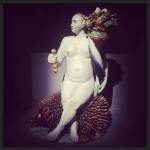


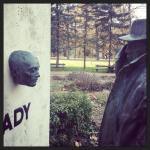


1stDecember 2018
Vienna
Overnight it has snowed. Vienna looks as it’s meant to look, which is to say, sugar-dusted, dreamy, Narnian. The snow makes strange animals of us all. Grey- winged bats of the guided tour men, armless beneath their thick, woollen capes. Grizzly bears of the old ladies in their brown, fur coats, clinging to the walls of the Belvedere Garten as they lumber slowly down the hill. Waddling penguins of some children, starfish of those who’ve been over-insulated in scarves, mittens, hats and 70s ski suits. They X across the Karlplatz clumsily, limbs so bulked they can barely move. And what creature are you in your impractical, blue velvet shoes, shod for pavements in warmer climes? An exotic bird? A cautious insect? A spider picking your way delicately from one gritted spot to the slip-free next? You catch yourself lurching in a café window. It is a common chicken you resemble most.
2nd December 2018
Kunsthistoriche Museum, Vienna
It’s closing time in the Kunsthistoriche and I pass a foot on my way out. The outer appendages are easiest to misplace. People are always losing the head and it’s not uncommon to sever a finger in a door or with a chopping nice. I once saw a man in Ballymena Casualty who’d cut his own arm off with a hedge trimmer; accidentally of course. This would’ve been around ’89. But, here’s a lad who hails from the old days; first or second century. Not quite Bronze Age, though he is rendered in brushed green bronze. My German’s not what it once was circa 1992 or 3, but I do my best to translate the gallery notes. “A Roman Senator’s foot, cast in bronze, separate from the rest of the statue.” I stumble, (no pun intended), over, “im sockel vergossen.” Surely, it can’t mean he’s forgotten his socks? He’s wearing sandals like a textbook Roman, but then again, my father always wears white sports socks with his sandals. He says it stops the sand getting between his toes. Forgotten socks are the least of this chap’s problems. He’s missing everything above the ankle joint.
3rd December 2018
Rathaus, Vienna
On December 25thwhen the last Christmas market closed its fairy-lit doors, and all the camera-happy tourists flew back to wherever it was they’d come from, and the pretend-to-be Santas hung up their false beards, and the decoration came tinselling down, and there was no more need for vats of roasted chestnuts, or girls dressed as elves singing Frosty the Snowman, and the festive sleigh rides jingle belled to a halt, and everyone declared that they’d drunk more than enough gluhwein out of mugs shaped like Father Christmas’ head, and the fake snow was rolled up and packed away in cardboard boxes alongside the fake icicles and the fake boughs of mistletoe and holly, and Christmas was over for another year, the people of Vienna were left with one small problem. What should be done with approximately five hundred empty, wooden garden sheds?
4th December 2018
MUPA, Budapest
After the final note is struck and the movement is clearly over, the conductor holds the entire orchestra in a ninety second silence. The audience have not expected this. They pause, one thousand six hundred of them, dressed in their midweek finest, hands up, like bookends just waiting to collide. The conductor keeps his back to the room and does not move, does not even flinch for almost two minutes. The silence seems louder than usual. It is a loaded kind of silence. You scan the faces of the string section, for they are stood closest to the pit. They are statues -every one of them-even the second cello who, mere minutes ago was thrashing about like a man possessed. The soprano, standing stage right, is barely breathing. She hasn’t blinked once in over a minute. This is not natural. You begin to wonder if time has slipped and stuck, like in that Kurt Vonnegut novel you love so much. You’d swear, actually swear, that the room was frozen. But then, the conductor turns, and bends at the middle and the whole orchestra unsticks behind him: strings, brass, woodwind, percussion melting into out rapturous applause.
5th December 2018
Nyugati Station, Budapest
An elderly lady sits opposite you on the train from Budapest to Debrecen. She is small and mousy, her hair escaping in cloudy handfuls from the edges of a knitted cap. From the shape of her cheeks and the way her lips pucker -similar to your granny’s lips, before she died- you can tell she’s out without her teeth. The old lady sits in the middle of the seat, sandwiching herself between a stout leather handbag and a rake of plastic carriers containing the week’s shopping. You smile at her. She smiles back and tips her chin. She says something in Hungarian. You say, “I’m sorry, I only speak English.” You lift your shoulders in an apologetic shrug. She doesn’t seem to hear or chooses not to hear and continues to rattle on in thick Hungarian. You smile. You nod. You try to appear interested. Your mother’s brought you up to be polite. Outside the train’s window the city slides by -architecture, billboards, telephone wires- but you cannot give it your full attention. You have no idea what you’re being told. You know you don’t look like a local girl; something to do with your patterned clothes. So, perhaps this woman has sought you out for your ability to listen and not understand. You’d kill to know what she’s telling you: a secret, a lie, a truth more suited to the confessional. When she rises to leave at a countryside station you feel the need to offer absolution but you don’t know the words for this in English. Where would you even start in Hungarian?
6th December 2018
Debrecen
In the park, next to the university, the pond has frozen in sections. Rust-coloured leaves, nuts and twigs are caught in the ice. Not moving. Not fading or rotting. This is the idea of Autumn, fossilized. Elegant, green-crested ducks skirt the edges of the melt, or dabble, flat-footed across the more solid sections of ice. Their squat bodies bumble and jerk. They are much too hefty for their spindly legs. Watching them, you are reminded of the snow-suited children learning to skate, waddling and stumbling round the rink in the square. Beneath the ice, orange peel carp swarm and flicker, their colours beaming through several inches of solid glass. You are three layers of sweater, coat, hat, gloves, jeans, scarf, socks and sturdy boots and still the cold has stripped the joy right out of your bones. You watch the goldfish dance round the limits of their frozen world. Their skin is so thin, almost translucent, yet they are sunshine and fire to look upon. It is a miracle, an actual living miracle, that the cold has not caught up with them.
7th December 2018
Debrecen
The Hungarian poet, Ady Endre, (say it first name second, as they’re wont to do in Hungary), is very much dead and rendered here twice in greenish bronze. Once, downtown, by the good cake place, sat with a book on an empty bench. All smiles, as he stretches his arm outwards as if to say, “sit down, join me, take the weight off your feet. Let us talk awhile of poetic things: love and temporality, patriotism and, obviously, death.” This perhaps was wishful thinking, or romanticism on the part of the sculptor and those various benefactors who commissioned the piece. The second sculpture shows Ady trapped inside a wall just a short wooded walk from the University of Debrecen where he studied Law for his second degree. Half his face is glaring out at his own face, which is coming back to meet itself. Both faces look equally angry or perhaps unimpressed, which is understandable really, seeing as Ady -dead at 41 from syphilis- now finds himself trapped, frozen even, in small town Debrecen, the place he once used as symbol/motif/metaphor for all that was worst in Hungary.
8th December 2018
Mucsarnok, Budapest
In 1994 the Hungarian artist Andras Borocz placed a number of his small Bread Head sculptures in Popieluscko Square, Brooklyn. The Square takes is name from a Polish priest who was murdered in 1984 for supporting the solidarity movement. Each of the sculptures was fashioned from a loaf of bread and resembled a human face. Borocz created these pieces during the early 90s surviving, almost entirely, on the white bread removed during the carving process. Each sculpture was coated in a translucent glue to preserve the bread from time and the elements. The artist noted that though Popielusko Square is rife with pigeons well-used to feeding on crumbs and scraps, for the duration of the performance they kept their distance from the Bread Heads. New York pigeons are particularly savvy. They know the difference between food and art.
December 2, 2018
Christmas Markets and Other Things I Could Do Without
[image error]
I am in Vienna. It is cold and snowing and everything looks like a Christmas card. I am eating a lot of cake, seeing some great art and -though I’ve packed the world’s most impractical shoes- mostly having a wonderful time. The only thing I do not love about Vienna in December is the epidemic of Christmas markets. Note my use of the word epidemic. There’s not just one. There are dozens of them. Every time I shuffle, (impractical shoes plus icy pavements), round a corner into a charming square or Platz I am confronted by a huddle of little wooden sheds -similar to the one in which my dad keeps his lawnmower- draped with fairy lights and fake snow.
They are almost all selling gluhwein in mugs shaped like Father Christmas’ head, or sausages, or dangly things carved out of wood. I do not want to buy mulled wine in a mug shaped like Father Christmas’ head or anything carved out of wood, (though I am quite partial to sausages). I do not want to listen to a man in a Santa hat covering Mariah Carey on an acoustic guitar. I do not want to browse round garden sheds in the cold, pretending I’m interested in Celtic jewellery or handmade soap or grooming products for men with beards, whilst a woman in a thermal fleece and one of those knitted hats with plaits for earflaps glares murderously at me from behind the counter.
I’m just going to come right out and say it, I really don’t like Christmas markets. I pretty much loathe them. The crowds. The cold. The way there’s never anywhere to sit down. I don’t like any kind of markets at all. (I include in this list the following markets: Continental, food, craft and the ones where you can buy ten dishcloths for a pound. I have not yet formed an opinion on cattle markets). I realise this makes me a kind of deviant; most people I know seem to have been born to browse. Whilst, you’re already judging my lack of festive spirit I thought I’d take the opportunity to make a short list of things I don’t like though everyone else does.
Musicals– No surprises here. I’m always banging on about my issues around the suspension of disbelief and people dancing on tabletops.
Baked Beans– Literally, the only food I can’t keep down. It’s the consistency that bothers me. Who wants to eat tomato flavoured flour?
Groundhog Day – I’m sorry, but it’s the most boring movie I’ve ever watched. Is that the point of it? If it is, it’s a stupid point.
Prosecco- Two words on Prosecco: Fizzy Vomit.
Animated films – Don’t be emailing me to say have I seen Howl’s Moving Castle or Spirited Away. The answer’s yes, and I’d still rather be watching something with actual people in it.
Russians – The writers rather than the people. Tried. Tried again. Kept trying. Eventually gave up.
Skype/Facetime/Any service allowing me to see your face whilst talking to you – I do not want to see your face while I’m talking to you via a machine. I find this strange and alienating. I’m only just starting to get used to phones.
London – I thought about this really hard and for every one pleasant visit to London I’ve had approximately six very stressful London experiences. I’m really not sure it’s actually worth going.
Lord of the Rings – I know that Lord of the Rings is the reason you fell in love with books but walking trees and Hobbits are to me the baked beans of literature.
Queen – the band not the monarch. Radio Ga Ga is the sound of a migraine headache and don’t even get me started on Freddie Mercury’s mouth.
Two late but festive entry:
Cinnamon-scented anything– If Radio Ga Ga‘s the sound of a migraine, then the smell of cinnamon is the catalyst. I include in this list candles, coffee, cinnamon-infused pinecones and sachets for setting on top of your radiator. Nb. this may be a longterm symptom of the year I spent working in the Yankee Candle Shop.
Best of the year lists published in November: It is only November. There is still a full month left in the year. You may yet watch the movie or read the book or see the play that will turn your year upside down. Why can’t we wait ’til the 1st of January to publish our recommendations?
October 22, 2018
Write Here Novel-Writing Course
I’m really looking forward to teaching a short six week course on novel writing for Write Here. The course is based in Belfast and kicks off in February 2019. For more information click on the link below. Places are limited so book early. Have a little read at the interview below to find out more about my writing practice.
Author interviews #11: Jan Carson
In the next in our series of author interviews, we chat to Northern Irish novelist Jan Carson (above), who’ll be teaching our seven-week Write Here… in Belfast novel-writing course from February 2019. Jan’s debut novel, Malcolm Orange Disappears, and short story collection, Children’s Children, were published by Liberties Press, Dublin. Her next novel The Fire Starters will be published by Doubleday in April 2019. Here, she talks to us about shaping characters, writing in the midst of busy shopping centres and how she escapes the family on Christmas Day in order to add to her wordcount.
Could you tell us a little bit about how you became a published author? Did you always want to be a novelist – and who and what helped you along the way?
I’ve always been a big reader but I never really wrote much. I moved to the US in September 2005 and bought myself my first laptop before I left Belfast. When I arrived in Oregon, I told people I liked to write. It was a lie but it scared me into actually beginning to write stories. By 2007, I was having short stories published in different literary journals. I began my first novel in 2008. Actually, that’s a lie. I wrote a whole novel in 2006. But it was terrible. I binned it almost straight away. However, it did teach me the discipline and fortitude required to write something as long as a novel, when you’re more accustomed to the short-story format. I finished my first decent novel by around 2011 and a friend who worked in publishing took an interest in it and helped me secure my first contract. It took me almost six years from beginning that novel to seeing it on the shelves. With my fourth book I acquired an agent, Kate, who is brilliant and helped to secure a three-book deal for me. This has given me a level of security as a writer but it means I’m now expected to produce a manuscript per year. My whole approach to writing has changed. I’m much more focused now. I write every day, whether I feel like it or not. I’m more comfortable with writing first drafts that are going to go through multiple edits. In the past I was something of a perfectionist and this made me quite a slow writer. Finding a good agent and a good editor have been two of the most important things that have happened in the last couple of years. Kate takes a lot of the pressure off me and deals with publishers directly so I don’t have to worry about it. Alice, my fantastic editor, has really helped me to hone my writing, in order to focus in on the best parts and cut out the flab. I’m always amazed how she can make a chapter say more, even though she’s taken the wordcount down.
How do you get the ideas for your books?
Ideas come from lots of different things. The way I write novels is that the main plotline often runs alongside lots of different smaller plots, so I’m always on the lookout for ideas or characters which strike me as interesting. I listen a lot to people chatting in coffee shops, on the bus and at Tesco. It’s amazing how many stories begin with an overheard piece of conversation. I also love to research different topics. My new novel, The Fire Starters, is set around parade season in East Belfast. Though I live there, and grew up in a Protestant community, I’d never really looked into the roots of some of the cultural traditions associated with bonfires, the Twelfth of July and the Orange Order. It was really interesting to find out a bit more and also stumble upon some really interesting details I knew nothing about.
When do you write – and why?
I have no pattern to when or where I write. I’ve got such a crazy work schedule that it never looks the same two days in a row. However, I do prioritise my writing. So, I’ll sit down at the beginning of the week and schedule two-hour blocks of writing into each day. I’m getting much better at turning down appointments if they threaten to encroach upon my writing time. You have to treat it like a job.
You’re faced with a blank Word document or empty piece of paper in front of you. How do you begin your book?
Every time I start a new book it feels a little bit like giving birth. There’s a kind of pregnant period in which you’re thinking about the characters and the plot, maybe taking notes, collecting small pieces of research. I always put the actual moment of writing the first sentence off for as long as possible, but eventually there comes a point where I feel compelled to start writing. Then, it’s almost a relief to start getting your ideas down. I’m becoming more and more comfortable with the idea of a rough first draft, so I’m not too concerned about the first sentences being perfect. I almost always come back and change my opening.
What’s your writing process? How many words do you set yourself and what do you do your writing with?
I write on a very light laptop that I carry almost everywhere with me, so I can make the most of any small moments of free time I get. I write for two hours a day. I almost always hit around 1,000 words in two hours unless I’m at a tricky part in a novel. Each day, I like to try and leave my writing in a spot where it’s easy to pick up the following day. I write every day of the year except Christmas Day. Though sometimes I sneak away from the family and have a sneaky wee write then, too.
Do you work in total silence – or do you prefer to listen to music while you write?
Neither. I’m a strange writer. I can’t stand silence and don’t really listen to music that often. I actually like bustle – so often I write in busy spots like coffee shops or airports. I like to be able to watch people, how they move and interact, when I’m writing a story. Some of this practice came from my early years of writing, when I wrote in lunch and coffee breaks at work. I worked as a sales assistant in a shop and most of my first novel was written in the coffee island of a shopping centre. I’ve had to learn how to write in strange and noisy places because I’ve rarely had the chance to write in silence. I’m glad I can do this now as it really helps me have continuity in my writing when I’m travelling around the world.
Where is your desk – and what’s on it?
I’m afraid I don’t have a desk. I don’t have a regular writing spot. I mostly write outside my house. But when I’m at home I quite often write at the kitchen table or in bed, with a cup of tea to hand.
What are the greatest obstacles to your writing?
Time constraints. Most people who aren’t writers don’t realise how little money there is in publishing books. Most of us are madly juggling different jobs and projects in order to make ends meet. I’m pretty disciplined about fitting my two hours of writing each day in around my other commitments, but I often fantasise about what it would be like to have unlimited time. I’m usually coming to my work tired and it would be wonderful to see what writing with a clear head and no other preoccupations would actually feel like.
What’s more important to you – characters or plot?
I’m always drawn to people. I’m quite a nosy person. So, I’m usually attracted by interesting, unique characters. I’m a firm believer in the notion that a well-developed character will really help shape your plot. I’m currently working on a novel set in a primary-school class and, before beginning the novel, I wrote a short story about each of my characters. It was a tremendous help when it came to writing the novel having already spent so much time getting to know my characters and how they’d react in different situations. Saying that, I also love a strong plot and I’m not a big fan of stories where nothing really happens.
What do you think a creative writing course can do for an aspiring author?
I don’t believe you can teach imagination, but if an aspiring author has ideas, I think a creative writing course can really help give them the necessary tools to shape these into powerful stories. I also firmly believe in the community that emerges from creative writing courses. Much of what we do as writers is incredibly solitary – so a creative writing course can offer an essential opportunity to find community with other writers. Learning how to workshop pieces, take feedback and creative criticism is an important part of writing, and a creative writing workshop can be a safe, non-threatening environment in which to develop these skills.



